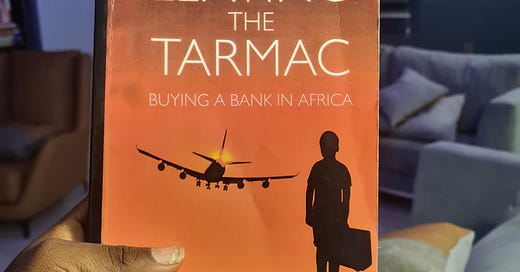Leaving The Tarmac
In his teens, Aigboje Aig-Imoukhuede was at the airport to catch a flight that would take him from Lagos to Kaduna. Just him and his small suitcase, sitting quietly in the departure lounge, waiting fo
In his teens, Aigboje Aig-Imoukhuede was at the airport to catch a flight that would take him from Lagos to Kaduna. Just him and his small suitcase, sitting quietly in the departure lounge, waiting for his flight to be called. It was the 1980s. This was back in the days of Nigeria Airways — the only real commercial airline in the country at the time. It was government-owned, full of bureaucracy, and frustratingly unpredictable. Even with a confirmed ticket, you weren't guaranteed a seat. But in his innocence, he didn't know how the system really worked.
When they finally announced that the flight was ready for boarding, chaos broke out. The experienced travellers knew the game — they leapt to their feet and dashed toward the gate. He followed, struggling with his suitcase, only to be shoved aside by bigger, faster people who knew that boarding wasn't about order — it was survival of the sharpest.
By the time he got to the stairs leading up to the plane, the door had already been shut. The flight was full. The plane took off — and he stood there, suitcase in hand, watching it disappear into the sky. The plane left him at the tarmac.
He cried. And cried.
But he also made a vow that day. NEVER AGAIN! NEVER AGAIN WOULD BE LEFT STANDING AT THE TARMAC. He would always leave the tarmac. Always. That became the mantra of his life. And the title of this book.
In Nigeria, one needed Godfathers, and so many other factors to move upward. In the case of Aigboje, he wanted to move upward through excellence, hard work, trust, vision and courage. He would not follow the Godfathers path. He would not follow the corruption path. It would be the product of sincere effort.
Access Bank is proof that he succeeded. When he took over Access Bank in 2002, it was a struggling bank with 90,000 customers; by 2012, it had 6.5 million customers. It had 17 branches in 2002; in 2012, it had 345. In 2002, it had 1.9 billion in capital naira; in 2012, it had 250 billion naira. By whatever measure, Access Bank is a success. It is a story that has many lessons for entrepreneurs around here.
Of course, Aigboje described his friendship and professional relationship with Herbert Wigwe. Oh, dear Herbert. Actually, it was Herbert that made me read this book to the end. I read it because it was, and is now, the only thing left behind that I can look back into to find good information about the man. The story of Access Bank's growth continued with Herbert. I can only imagine the story Herbert would have written. He took Access from where Aig dropped off and escalated everything. If you read this book, you would realize it was inevitable. And it was intentional. These guys planned everything from day one. Perhaps this is why they succeeded with Access Bank. It's all in the thinking from Day 1.
I wish the book had more details. You can't tell me this is the whole story of Access Bank from 2002 to 2012. There was definitely more. In the Foreword, Olusegun Obasanjo alluded to that in the question he asked Aigboje before writing it.
We need more memoirs, biographies, and autobiographies of those who built Africa's thriving businesses. The author himself complained about this. It was delightful to learn about the books he read and how they shaped him. Readers are leaders. There is no two-way about this. Do you want to lead? You gotta read.
Read this one if you want an original African business success story.




